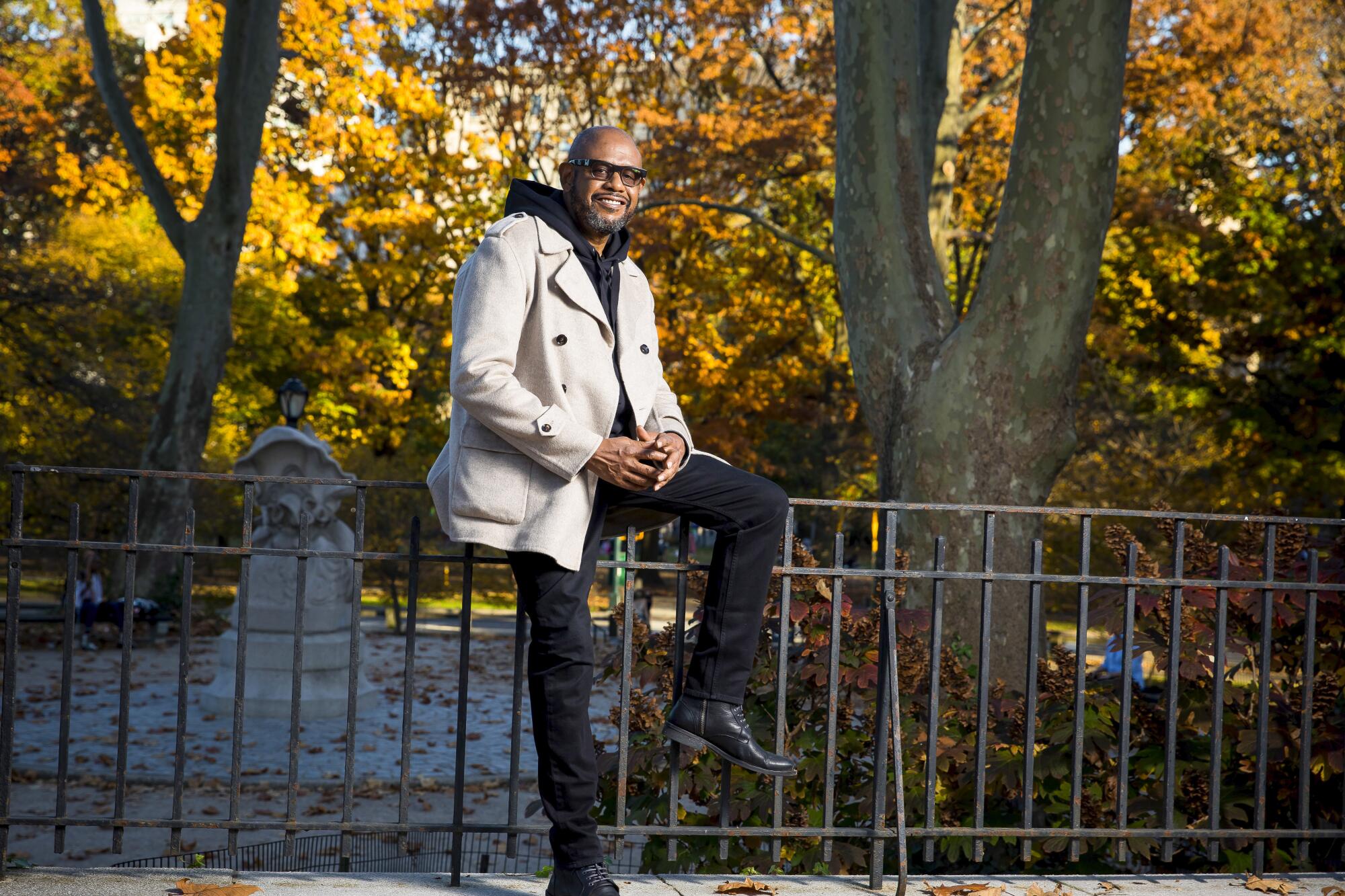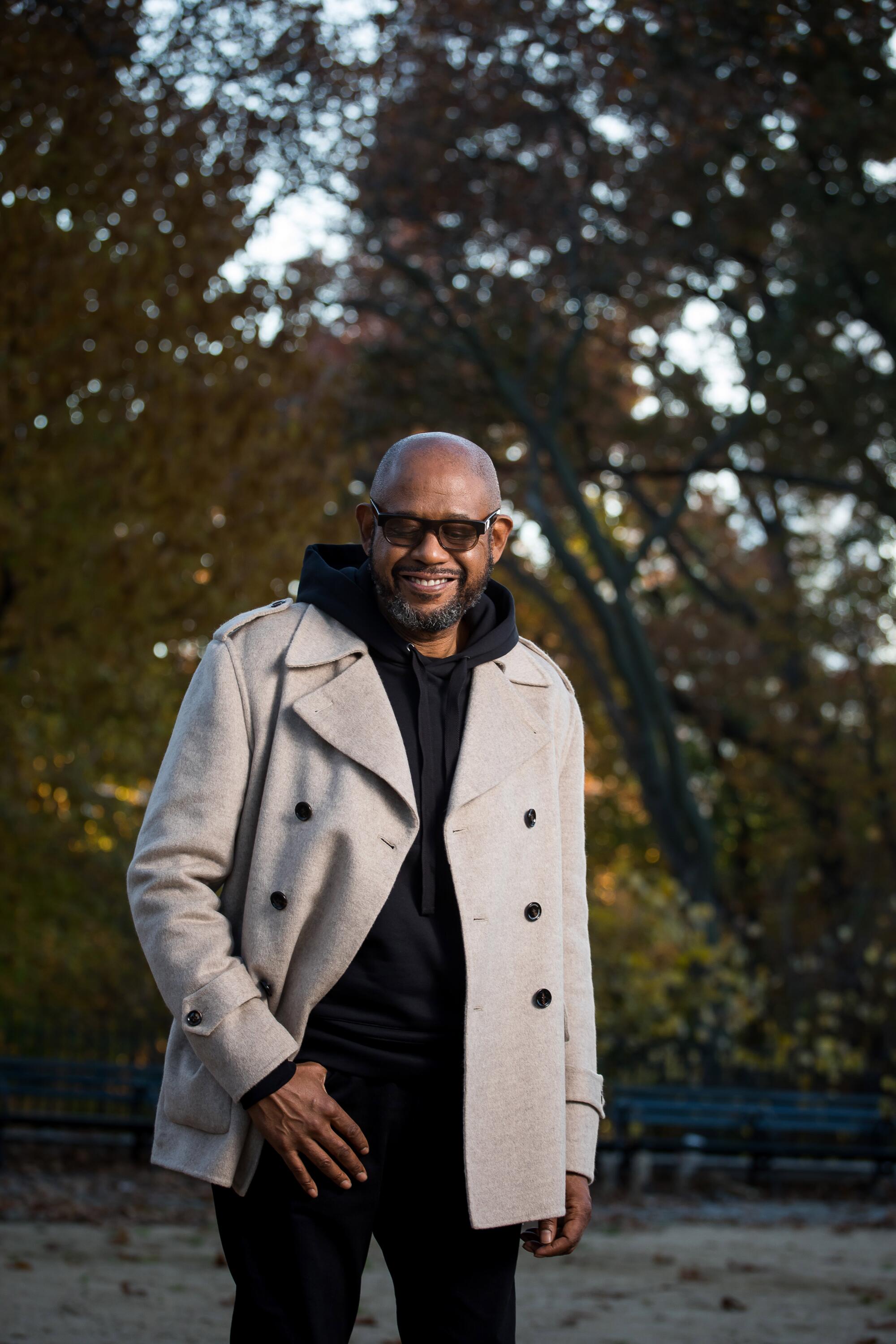
- Share via
The most memorable characters have the most melodic names: Willy Wonka, Caractacus Potts, Mary Poppins and, now, Jeronicus Jangle.
The last is the leading man of the Netflix musical “Jingle Jangle: A Christmas Journey,” which reinvigorates the fantasy storybook elements of beloved family films with a powerhouse, and majority Black, cast — including Phylicia Rashad, Anika Noni Rose and Keegan-Michael Key. But it’s Oscar winner Forest Whitaker who delivers a surprisingly delightful turn as Jangle, whether flying through his magical toy shop or dancing in the middle of a snowball fight.
“He’s a great dramatic actor — whenever you see him onscreen, he has power and gravitas and people are afraid of him,” said writer-director David E. Talbert. “But Forest Whitaker, the person, is a gentle giant, a warm teddy bear, who I knew could bring out the vulnerability and joy of this three-dimensional character. And he looks like Black Santa.”
The role — of a heartbroken inventor recovering from a major betrayal — mirrored Whitaker’s own artistic crisis, and pushed him to revisit a skill set he’d long left behind. From his home on New York’s Upper East Side, the 59-year-old Oscar winner spoke with The Times about stretching his range — both that of his singing voice and the types of roles he plays onscreen.
What drew you to this role?
When you first meet Jeronicus [played as a youngster by Justin Cornwell], he’s on top of the world — and by that, I mean, he was living in joy. And then he loses his most prized inventions — which is a part of his spirit, really. He’s somebody who believes so much in joy and magic, and then he’s robbed of it. It’s a story people can relate to, because we’ve all been in difficult places where we felt like we couldn’t go on because life had hit us so hard.
But it’s possible, even if you’ve fallen, to rise. You can reawaken the joy inside of you; your dreams can still come through in different ways. And there’s always a possibility, as long as we’re alive and striving and stepping one foot forward, to change it.
I do feel lucky to play Jeronicus because he’s this character who’s trying to find himself and his passion again. In a way, I was taking a parallel journey as an artist.
The Victorian era extravaganza “Jingle Jangle: A Christmas Journey” from writer-director David E. Talbert is set to be a holiday movie classic.
How so?
Originally, I wanted to work as an actor as a way to explore the human condition and how we connect with others, and every part I’d play was about expanding that understanding. I wanted to learn something new about someone else, and also myself. And then, at some point, that joy of invention and exploration, it just got blocked. I didn’t feel like I was doing good work, I couldn’t make my work stronger. I felt like I had lost my passion.
Starting with the play “Hughie” [on Broadway in 2016], I’ve tried to get it back again and really push myself to grow. So the fact that “Jingle Jangle” is a musical, it was a great challenge, because I hadn’t sung in such a long time.
How did you prepare for these vocal demands?
I started taking vocal lessons right after I got the script. I was worried I wouldn’t be able to handle the complexities of the songs. I felt like I was straining whenever I’d get to a certain high note because I didn’t really have a falsetto. I called David and said, “I can’t do this. Can we change the key so I can sing it?” But he wasn’t really having it!
So I just buckled down and kept working on it with my vocal coach, Matt Farnsworth, and started to get it. And then I got so excited that I asked David to get more and more songs added. So I think I have the most songs in the movie.

Your big ballad, “Over and Over,” is a major moment in the movie. Did you sing it live?
Yeah, but that wasn’t planned. I had recorded it in the studio already. But when we were on set, about to shoot the first take, David said, “Let’s try it without the playback. Let’s just let you sing.”
It’s a really emotional song about regret, the moments you wish you could take back or re-create, the loss of what you could have achieved: “Over and over and over again / I think of my life and what might have been.” There’s a blending of my own experiences — moments I’ve missed, not having told someone I cared — and my imagination of what the character has gone through: He’s lost his wife, his daughter left, there’s just so much loss.
I tried to put those feelings of pain and loss and rejection into the performance. It was quite frightening, but there was so much support from the cast and crew. Everyone clapped at the end, which makes you feel like you did OK.
You’ve rarely sung onscreen, even though you studied music performance in college 40 years ago. Why is that?
I don’t know. I loved singing. I was in a doo-wop group when I was 13. We didn’t have real performances or anything, but we’d practice old R&B songs in the neighborhood. Spinners, Commodores, Temptations, Whispers, those kinds of tracks. And I played the baritone horn in junior high, and that’s how I started first reading music. I sang in the high school choir; in college, I had my first experiences going abroad by performing in different cathedrals across London with the madrigal choir. I studied classical voice at USC, and I got my first agent from my first professional play, “The Beggar’s Opera.”
Originally, I was thinking I would go do musicals on Broadway. But I guess I was concerned, with the Italian arias I was working on, that I wasn’t communicating to the people I knew, and that I wasn’t going to be able to connect in the way I was hoping. I had a scholarship at the USC music conservatory as a singer, but they also accepted me into the acting conservatory. So I made the decision not to sing anymore, even though I told the guys at the music department that I wouldn’t stop. I switched to acting, and I pretty much left music behind.
Throughout your career, you didn’t really go out for any musical roles, onstage or onscreen?
No. And if I ever sang in a movie or something, I’d always do it in character. Like, a couple lines from Diana Ross [“Baby Love”] in “Phenomenon” and a little bit of the hymn “Be Grateful” with Jennifer Hudson in “Black Nativity.” Sometimes it’d be off-key, because that’s how the character would do it! But it was never a straight-up musical, where you’re breaking out into a song and dance because normal words just can’t express how you feel.
That’s why I was really nervous [about “Jingle Jangle”]. I mean, for some reason, I used to get embarrassed if I’d sing in front of my kids. But I did get a lot of joy out of doing it. You get a different feeling when you really get a chance to sing. Even if the song is sad, there’s a fullness to it. I felt like a kid again. I’m so thankful to David for this opportunity. We’ve known each other for 10 years but we haven’t worked together until now.
I would love to do some more musicals. I also had a good time working on my comedic timing, and would love to do more of that too.
So, would you say you’ve rediscovered your passion for acting?
Yeah. I can feel the magic again in everything I’ve done since then. Even if it’s a darker character, like in my show “Godfather of Harlem” [on Epix], I’m enjoying the process of playing him, even though he’s not an easy character to carry. Same with [the Aretha Franklin biopic] “Respect.”
Though that movie has been delayed until August 2021, what can we expect from your portrayal of C.L. Franklin?
He’s a minister who’s famous in his own right because he invented a style of preaching called “whooping” and he was also a civil rights activist, walking side by side with Martin Luther King. In trying to mold his daughter into this great singer from a very young age, he has to learn to allow her the room to be able to speak on her own. It’s a delicate character performance, quite emotionally aggressive and intense because he’s a passionate, spiritual and sometimes abusive father.
But it’s a special film. Jennifer Hudson has played my daughter three times now, but this is the first time we actually have more than one scene together and really get to explore the arc of our relationship.
The case of Oscar Grant’s killing at the hands of Oakland police was recently reopened. As a producer of the film “Fruitvale Station,” which told his story, how did you feel when you heard that news?
I’m so proud of that movie. It was important for us to tell that story, and obviously, it still resonates today. It really saddens and pains and hurts me to see the brutality that surrounds some of our racial misconceptions.
Reopening it allows us to look at it again in an honest way, and to be able to say that people are not going to be able to just walk away from injustice. We’re not going to just stand by, we’re going to find the truth. And hopefully, by exposing the truth, we’ll be able to reshape the narrative, change perspectives, make people really look at themselves and their judgments and what they’re choosing to do.
More to Read
Only good movies
Get the Indie Focus newsletter, Mark Olsen's weekly guide to the world of cinema.
You may occasionally receive promotional content from the Los Angeles Times.











